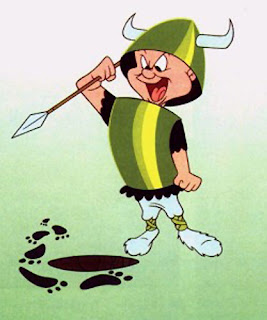 |
| Randall McCoy (Bill Paxton) and Devil Anse Hatfield (Kevin Costner), the magnificently scruffy-looking patriarchs of their respective clans. |
Even during its premiere on ratings-unfriendly Memorial Day, the first outing of the three-night miniseries Hatfields & McCoys pulled in a record-breaking 13.9 million viewers during its inaugural telecast at 9 p.m. That number marks a new nonsports high for ad-supported cable networks.
For those who need a brush-up on
American History, the series chronicles-- with a bit of fictionalized
gloss-- a decades-long feud between two extended families in the
Kentucky-West Virginia border in the late 1800s. And feuding was done
the old-fashioned way back then, with Henry and Winchester rifles,
summary executions and a pitched open battle or two.
The whole series was directed by Kevin
Reynolds and essentially produced by Kevin Costner, so it seems that
Waterworld was not a source of lingering bitterness between the two.
A few notes:
• Care was taken not to choose sides
in scripting the feud between the Hatfields and McCoys, but at the
same time the families were shown to be very different. Randall McCoy
(Bill Paxton), the patriarch of his family, is a deeply religious man
of difficult means who nonetheless carries seething resentment
towards Devil Anse Hatfield (Costner), an Atheist and logging
entrepreneur. So, even though the fight began through a series of
trivial slights, differences in religion and wealth fueled it. I
think everyone who had a casual acquaintance with the history of the
feud thought it was a scrap between two undifferentiated clans of
inbred hillbillies: the miniseries effectively dispelled that ignorant notion.
 |
| Two McCoy girls. Just showing they weren't all a bunch of scruffy hillbillies. |
The credits provided the answer to this
uneven look: the whole show was shot in Romania. Unspoiled forests,
cheap labor for building log cabins, and equally cheap but
inexperienced art department staff.
• There is an important, timely
message in Hatfields & McCoys, an abject lesson in the proper role
government should take in our lives. The hilly, rural borderlands of
Appalachia in the 1870s-1890s were under no real jurisdiction, and
the rule of law was unenforced. This is a situation many libertarian
and far-right politicians are positively avowed to return us to: one where
citizen's rights are untrammeled by any form of government, our
property rights and livelihoods entirely the responsibility of the individual. It's
Libertarian, Tea Party paradise.
But the lesson of Hatfields &
McCoys is showing the bloody anarchy of libertarian realpolitik, a real historical example of how disputes tend to resolve in areas of weak central government
where the rule of law is either unavailable or ignored. Accusations concerning a stolen pig or an offhand comment about having sex with a dog
(both are shown as catalysts of the feud) quickly escalate to
bloodshed. Courts are shown as biased to one side or another, and
both families have no respect for them in any case. Most of the young
men in both clans are seen as being constantly drunk, armed to the
teeth, reflexively belligerent and, abetted by their elders, unafraid
of any legal repercussions for their violence.
The tragedy of the Hatfield-McCoy feud
is no doubt playing out today between unknown families in countless
lawless places in the world: Somalia, rural Pakistan, Congo, probably
even Romania. You don't have to be a cynic to have an idea of what
awaits us in Libertarian Paradise.










